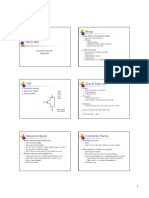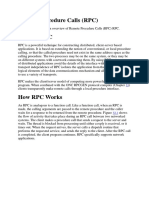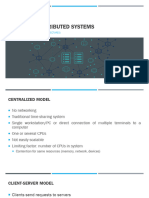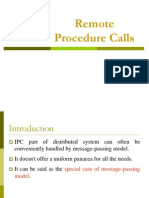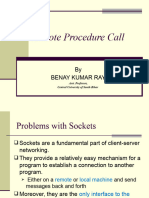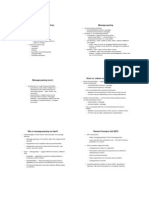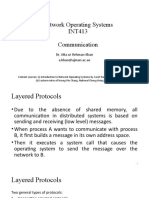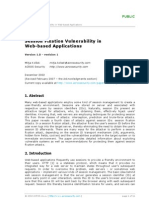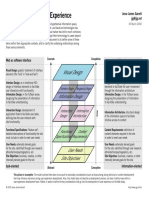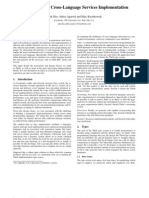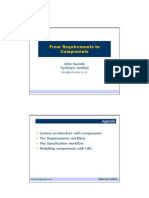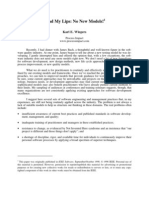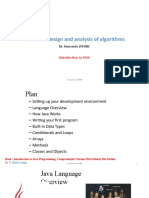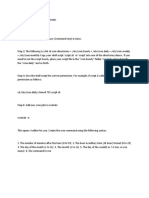Architecture of
MessagePack
Sadayuki Furuhashi
�What s MessagePack?
Efcient serialization library
Rich data structures - compatible with JSON Dynamic typing Synchronous, Asynchronous and Callback style Concurrent calls with multiple servers Event-driven I/O Interface Denition Language (IDL) - compatible with Thrift
Remote Procedure Call (RPC)
�Ecient Serialization
1. Compact
Binary-based format Embed type information
2. Fast
Zero-copy (C++) Stream deserialization
�Format of MessagePack
JSON null Integer Array String Map
null 10 [20] 30 {40:null}
MessagePack
c0 0a 91 14 a2 3 0 81 a1 4 0 c0
�Format of MessagePack
JSON null Integer Array String Map
null 10 [20] 30
MessagePack
c0 0a 91 14
4 bytes 2 bytes 4 bytes 4 bytes
1 byte 1 byte 2 bytes
a2 3 0 bytes 3 81 a1 4 0 c0 5 bytes
{40:null}bytes 11
�Format of MessagePack
Fixed length types
Integer Floating point Boolean Nil
type value
Variable length types
Raw bytes Array Map
type length body...
Type information
�Type information
Type information Types
0x00 0xc2 0xc3 0xca 0xcb 0xcc 0xcd
0xc0 0xe0
nil false true float double uint8 uint16 uint32 uint64 int8 ...
0xce 0xcf 0xdf ...
�Embed value
Type information
0x00
Types
0x00 0xc2 nil false true float double uint8 uint16 uint32 uint64 int8 ...
Positive FixNum
0x80 0x90 0xa0 0xc0 0xe0
0xc3 0xca 0xcb 0xcc 0xcd 0xce 0xcf 0xdf ...
FixMap FixRaw
FixArray
Negative FixNum
�Zero-copy serialization
�Zero-copy deserialization
�Performance
It measured the elapsed time of serializing and deserializing 200,000 target objects. The target object consists of the three integers and 512 bytes string.
�Remote Procedure Call
MessagePack-RPC
Inter-process messaging library for clients, servers and cluster applications.
�Remote Procedure Call
MessagePack-RPC
Inter-process messaging library for clients, servers and cluster applications.
Concept of Future Communicates with multiple servers concurrently
Multithreaded event-driven I/O
�Synchronous call
require 'msgpack/rpc' client = MessagePack::RPC::Client.new(host, port) result = client.call(:method, arg1, arg2)
�Asynchronous call
require 'msgpack/rpc' client = MessagePack::RPC::Client.new(host, port) future1 = client.call_async(:methodA, arg1, arg2) future2 = client.call_async(:methodB, arg1, arg2) result1 = future1.get result2 = future2.get
�Callback
require 'msgpack/rpc' client = MessagePack::RPC::Client.new(host, port) client.callback(:method, arg, arg2) do |future| result = future.get end client.join
�Concurrent calls with multiple servers
require 'msgpack/rpc' loop = MessagePack::RPC::Loop.new client1 = MessagePack::RPC::Client.new(host1, port1, loop) client2 = MessagePack::RPC::Client.new(host2, port2, loop) future1 = client1.call_async(:methodA, arg1, arg2) future2 = client2.call_async(:methodB, arg1, arg2) result1 = future1.get result2 = future2.get
�Connection Pooling
require 'msgpack/rpc' sp = MessagePack::RPC::SessionPool.new session1 = sp.get_session(host1, port1) session2 = sp.get_session(host2, port2) future1 = session1.call_async(:methodA, arg1, arg2) future2 = session2.call_async(:methodB, arg1, arg2) result1 = future1.get result2 = future2.get
�Concurrent calls with multiple servers
Client Session Loop Server
Client Session Loop Server
�Concurrent calls with multiple servers
Client Session Loop
shared event loop
Server
Client Session
Server
�Connection Pooling
Session
Session Pool Loop
Server pools these connections Server
Session
�Server architecture
Server Dispatcher Loop
Client
Client
�Event-driven I/O
Performance of the Loop is important. Java version uses Netty (JBoss I/O framework) Multithreaded Utilizes Javas NIO C++ version uses mpio (Kumofs I/O architecture) Multithreaded Utilizes epoll or kqueue Ruby version uses Rev (libev for Ruby) Utilizes epoll or kqueue
�Multithreaded event-driven I/O
��The MessagePack Project
http://msgpack.sourceforge.net/





